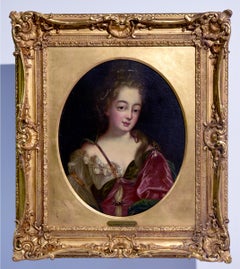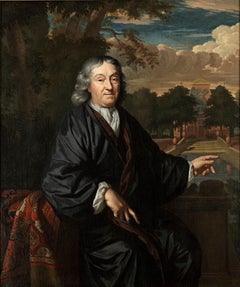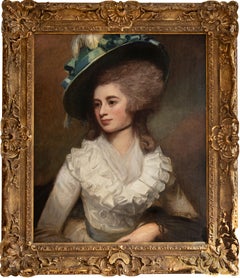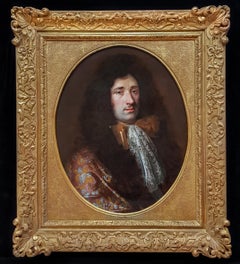(circle of) Nicolas de Largillierre Art
French, 1656-1746
Nicolas de Largillière or de Largillierre (Paris, 10 October 1656 - Paris, 20 March 1746) was a French painter.
Raised in Antwerp, where his family had moved in 1659, it was in the Flemish city that he began his apprenticeship in the workshop of Antoine Goubeau starting in 1668, mainly influenced by Rubens and the Flemish masters. [He entered the guild of the Sint-Lucasgilde as master of the city in 1674.
From 1675 to 1679 he traveled to England, where he approached the Vandyckian painter Peter Lely and was noticed by King Charles II. He will return there in 1685 to paint a portrait of the new King James II.
Returning to France, after 1689 he became one of the most sought-after painters, both for official ex-votos or allegories, and for orders of portraits by the nobility and the upper middle class. Nicolas de Largillière was, together with Rigaud, the portrait painter of the Regency era. He also proved to be a brilliant painter of still lifes, following the Flemish school.
To the solemnity of the gesture of the person portrayed he combined an uncommon search for minute details.
In 1686 he was admitted to the Académie royale de peinture et de sculpture, becoming a professor in 1705 and directing it from 1736 to his resignation in 1743.
Among his most important works we can mention: Portrait of Elizabeth Beaubarnais (Museum of Grenoble); Young Man as Diana (Louvre Museum); Ex-voto in Sainte-Geneviève (church of Saint-Étienne-du-Mont, Paris); Family portrait of Louis XIV (Wallace Collection); Portrait with the family (Louvre Museum).(Biography provided by Antichita Castelbarco)
1
to
1
1
1
2
2
1
1
Overall Height
to
Overall Width
to
1
2
2
1
1
1
1
2
1
2
6,958
3,340
2,513
1,213
2
2
2
2
Artist: (circle of) Nicolas de Largillierre
"Mme de Noirmont", Oil on Canvas Portrait, circa 18th Century
By (circle of) Nicolas de Largillierre
Located in Detroit, MI
SALE ONE WEEK ONLY
This painting titled "Mme de Noirmont" is an oil on canvas work from the studio of Nicolas de Largilliere, one of the most prolific and esteemed French portrait p...
Category
18th Century (circle of) Nicolas de Largillierre Art
Materials
Canvas, Adhesive, Oil
Portrait Gentleman 17th Century Paint Oil on canvas Old master France Art
By (circle of) Nicolas de Largillierre
Located in Riva del Garda, IT
NICOLAS DE LARGILLIÈRE (Paris 1656 - Paris 1746), circle
Portrait of a gentleman
late 17th century
oil on canvas
cm. 59 x 56
with frame 71 x 59
Beautiful portrait, of excellent quality, depicting an austere gentleman who peers intensely towards the observer. He is depicted three-quarters, powdered with the long wig called "Léonine", in a red velvet cloak...
Category
17th Century Old Masters (circle of) Nicolas de Largillierre Art
Materials
Canvas, Oil
Related Items
Male and female portrait, both in silk kimono, possibly textile dealers
By Christoffel Lubieniecki
Located in Amsterdam, NL
CHRISTOFFEL LUBIENIECKI (1659-1729)
Pair of portraits of a gentleman and a lady, both in silk kimono, before a country house (circa 1680)
Indistinctly signed “C.......” on a box under the man’s left hand
Oil on canvas, 79.5 x 67 cm each
Both sitters are portrayed wearing a silk “Japanese” coat. During the second half of the seventeenth the Japanese silk coat, an adapted Japanese kimono, became a real vogue in the Dutch elite. The exclusive Dutch trade contacts with Japan can explain the popularity of the kimono-style silk coats in the Netherlands. Everybody who could afford one, dressed in such a fashionable and comfortable coat and, like the present sitters, some proud owners had themselves portrayed in a “Japanese” coat often together with an oriental carpet to underline their standing and international connections. These portraits are the work of the Polish-born portraitist Christoffel Lubieniecki (also known as Lubienitski, Lubinitski or Lubiniecki)
Lubieniecki was first trained in Hamburg under Julian Stuhr and after 1675 in Amsterdam under Adriaen Backer and Gerard de Lairesse. He specialized in landscapes, generally of an Italianate character, and in portraits. The loving execution of these contented burghers, enjoying the garden vistas of their country house, places him alongside Amsterdam portraitists such as Constantijn Netscher and Michiel van Musscher...
Category
1680s Old Masters (circle of) Nicolas de Largillierre Art
Materials
Oil, Canvas
Free Shipping
H 31.34 in W 26.38 in D 1.97 in
Portrait of Lady Caroline Price
By George Romney
Located in Miami, FL
DESCRIPTION: Perhaps the best Romney in private hands. If Vogue Magazine existed in the late 18th century, this image of Lady Caroline Price would be ...
Category
1970s Old Masters (circle of) Nicolas de Largillierre Art
Materials
Canvas, Oil
19th century portrait painted in St Petersburg in 1819
Located in London, GB
Signed, inscribed and dated, lower right:
'Geo Dawe RA St Petersburgh 1819', also signed
with initials, lower centre: 'G D RA'; and signed and inscribed verso:
'Geo Dawe RA Pinxit 1819 St Petersburgh';
Also inscribed on the stretcher by Cornelius Varley with varnishing instructions.
Collections:
Private collection, UK, 2010
Literature:
Galina Andreeva Geniuses of War, Weal and Beauty: George Dawe...
Category
19th Century Old Masters (circle of) Nicolas de Largillierre Art
Materials
Oil, Canvas
Portrait de Femme ( Self Portrait ? )
By Leonor Fini
Located in Miami, FL
This is a possible self portrait by the famed female surrealist artist. It is also strikingly similar in style with it's exaggerated eyes to her portrait of Jean Genet, ( Leonor F...
Category
1940s Surrealist (circle of) Nicolas de Largillierre Art
Materials
Canvas, Oil
18th century portrait of the painter Nathaniel Dance
Located in London, GB
Collections:
Robert Gallon (1845-1925);
Private Collection, UK.
Oil on canvas laid down on panel
Framed dimensions: 11.5 x 10 inches
This highly engaging, previously unpublished portrait by Johan...
Category
18th Century Old Masters (circle of) Nicolas de Largillierre Art
Materials
Oil, Wood Panel, Canvas
Portrait of a Lady with a Chiqueador
Located in New York, NY
Provenance: Torres Family Collection, Asunción, Paraguay, ca. 1967-2017
While the genre of portraiture flourished in the New World, very few examples of early Spanish colonial portraits have survived to the present day. This remarkable painting is a rare example of female portraiture, depicting a member of the highest echelons of society in Cuzco during the last quarter of the 17th century. Its most distinctive feature is the false beauty mark (called a chiqueador) that the sitter wears on her left temple. Chiqueadores served both a cosmetic and medicinal function. In addition to beautifying their wearers, these silk or velvet pouches often contained medicinal herbs thought to cure headaches.
This painting depicts an unidentified lady from the Creole elite in Cuzco. Her formal posture and black costume are both typical of the established conventions of period portraiture and in line with the severe fashion of the Spanish court under the reign of Charles II, which remained current until the 18th century. She is shown in three-quarter profile, her long braids tied with soft pink bows and decorated with quatrefoil flowers, likely made of silver. Her facial features are idealized and rendered with great subtly, particularly in the rosy cheeks.
While this portrait lacks the conventional coat of arms or cartouche that identifies the sitter, her high status is made clear by the wealth of jewels and luxury materials present in the painting. She is placed in an interior, set off against the red velvet curtain tied in the middle with a knot on her right, and the table covered with gold-trimmed red velvet cloth at the left. The sitter wears a four-tier pearl necklace with a knot in the center with matching three-tiered pearl bracelets and a cross-shaped earing with three increasingly large pearls. She also has several gold and silver rings on both hands—one holds a pair of silver gloves with red lining and the other is posed on a golden metal box, possibly a jewelry box. The materials of her costume are also of the highest quality, particularly the white lace trim of her wide neckline and circular cuffs.
The historical moment in which this painting was produced was particularly rich in commissions of this kind. Following his arrival in Cuzco from Spain in the early 1670’s, bishop Manuel de Mollinedo y Angulo actively promoted the emergence of a distinctive regional school of painting in the city. Additionally, with the increase of wealth and economic prosperity in the New World, portraits quickly became a way for the growing elite class to celebrate their place in society and to preserve their memory. Portraits like this one would have been prominently displayed in a family’s home, perhaps in a dynastic portrait gallery.
We are grateful to Professor Luis Eduardo Wuffarden for his assistance cataloguing this painting on the basis of high-resolution images. He has written that “the sober palette of the canvas, the quality of the pigments, the degree of aging, and the craquelure pattern on the painting layer confirm it to be an authentic and representative work of the Cuzco school of painting...
Category
17th Century Old Masters (circle of) Nicolas de Largillierre Art
Materials
Canvas, Oil
H 66.25 in W 43.75 in
Portrait of Lady, Grace Saunderson, Viscountess Castleton Oil on canvas Painting
By Studio of Sir Peter Lely
Located in London, GB
Portrait of Grace Saunderson, Viscountess Castleton (1635-1667) c.1665-67
Sir Peter Lely and Studio (1618-1680)
Titan Fine Art present this work, which formed part of a collection of family pictures and heirlooms of the Saunderson, Viscount Castleton family and their descendants, the Earls of Scarbrough, at their magnificent family seat Sandbeck Park, where the Earls still reside today almost four hundred years later. It was painted in the studio of Sir Peter Lely...
Category
17th Century Old Masters (circle of) Nicolas de Largillierre Art
Materials
Canvas, Oil
H 35.04 in W 31.11 in D 1.97 in
GIRL WITH KITTEN- In the Manner of F.Ballavoine's - Italy Oil on canvas paint
By Giulio Di Sotto
Located in Napoli, IT
Girl with kitten - Giulio Di Sotto Italia 2008 - Oil on canvas cm. 60x50
Frame available on request from our workshop.
This painting is Giulio Di Sotto’s personal reinterpretation of the 19th century French painter Jules Frédéric Ballavoine...
Category
Early 2000s Old Masters (circle of) Nicolas de Largillierre Art
Materials
Canvas, Oil
Portrait of Abigail, Countess of Kinnoull, Signed Dated Godfrey Kneller Painting
By Kneller Godfrey
Located in London, GB
Presented by Titan Fine Art, this elegant and beautiful portrait depicts Abigail Hay, Lady Dupplin, Countess of Kinnoull; it is an excellent example of English portraiture from the f...
Category
18th Century Old Masters (circle of) Nicolas de Largillierre Art
Materials
Canvas, Oil
H 57.09 in W 47.25 in D 2.37 in
Portrait of a Young Gentleman and Pet Dog c.1680, Antique oil on Canvas Painting
By (Circle of) Mary Beale
Located in London, GB
The portrait genre was valued particularly highly in English society. Neither landscapes nor allegorical pictures were ever priced so highly at exhibitions and in the trade as depictions of people, from the highest aristocracy to scholars, writers, poets and statesmen. This charming portrait, presented by Titan Fine Art, of a fashionable young gentleman and his faithful pet is an excellent example of 17th century child portraiture in England. There is a remarkable beauty and sensitivity to the portrait. The face, particularly well rendered, has captured the character of this young man – both charming and at the same time mischievous.
Only the playful attention of a small dog suggests anything less than patrician dignity. Symbolism was important in portraiture and it provided a pointed and aspirational narrative that would not have been lost on contemporary viewers. For example, the presence of the dog, which was likely the boy’s pet, is at once a charming pictorial device and also a clear allusion to fidelity, trust and loyalty.
The hairstyle and the attire, notably the type of cravat with the blue ribbon, help to date this portrait to between 1670 to 1685. Until the late eighteenth century children were dressed as adults - boys were dressed like men in breeches, vests, and coats between four and seven years of age. The expensive lace is an indication to his family’s wealth.
Held in a good quality and condition antique gilded frame.
Born in Suffolk, Mary Beale, nee Cradock (1633-1699) was employed by many of the most distinguished persons of her time including nobility, landed gentry, and clergymen. Technically accomplished, her paintings are noteworthy for their honest and sympathetic portrayal. In 1651 she married Charles Beale...
Category
17th Century Old Masters (circle of) Nicolas de Largillierre Art
Materials
Canvas, Oil
H 35.44 in W 32.29 in D 3.15 in
Double Portrait of Sir John Rivers 3rd Baronet of Chafford, and Lady Anne Rivers
Located in London, GB
This magnificent grand-scale work, offered by Titan Fine Art, formed part of a collection of family pictures and heirlooms of the Rivers Baronets and their descendants for over 325 years, before it was dispersed by the last in the line in 1988. The work was painted by the most technically proficient painter in England after the death of Van Dyck, and the dominant court painter to Charles II and James, Duke of York, Sir Peter Lely. It is no surprise that for years Lely had no serious rivals, was enormously influential and successful, and one of the country’s most important painters – and his work influenced countless artists over generations. The exquisite carved and gilded auricular frame is an astounding work of art in itself.
The sitters in this exquisite double portrait are Sir John Rivers, who succeeded as the 3rd Baronet Chafford in 1657 (c.1638 - c. 1679), and his wife, Lady Anne Hewitt (c.1640-c.1689). They are seated in an outdoor setting beside a fountain modelled as a female figure with water issuing into a scallop-shell. The water, the elaborate sculpted fountain with its scallop-edged bowl, and the open shell in her hand are symbols of fertility - as such they make an appropriate allusion to Lady Anne’s potential as wife and mother, recalling Proverbs, chapter 5, verse 18: “Let thye fountain be blessed, and rejoice in the wife of thye youth”. This reference was realised, as Sir John and Lady Anne produced at least six children; their son George (1665-1734) became 4th Baronet of Chafford. The composition, thus, represents a celebration of marriage and was likely commissioned around the time of the betrothal (the marriage took place 26th Feb 1662 or 1663). The statues in the left margin are 'Youth and 'Old Age' and are a typical form of Memento Mori reminding virile young man that even they will lose their youth and grow old.
The Rivers family, originally of Kent, traces its history to Sir Bartholomew Rivers, in the reign of Edward IV. The family included several prominent members including several knights, a Commander in the King's Army, a steward of a ducal estate, a Lord-Mayor of London, and an M.P. John Rivers (c.1659-c.1651) was made 1st Baronet of Chafford in 1622 by King James I. The Chafford estate was the family seat and it remained so until the early 1700s with the death of Sir George Rivers, 4th Baronet (1665–1734), whose sons had all died. The Chafford estate was left to his daughters while the baronetcy passed to nephew John Rivers, 5th Baronet (c. 1718–1743), and then Sir John’s brother, Sir Peter Rivers-Gay, 6th Baronet (c. 1721–1790).
Upon Sir Peter Rivers Gay's death the estate passed to his eldest son, Sir Thomas Rivers Gay, 7th Baronet (c. 1770–1805). Sir Thomas, dying in 1805 with no children, bequeathed the estate to his mother Dame Martha Rivers Gay, who managed the estate until 1834 when she settled it on the then Sir Henry Rivers, 9th Baronet (c. 1779–1851) her younger son, before dying shortly thereafter in 1835. Sir Henry had married in 1812 to Charlotte Eales, with whom he had 6 sons and 8 daughters. Upon his death in 1851 the estate passed to his eldest surviving son Sir James Francis Rivers, 10th Baronet (1822–1869). Sir James married Catherine Eastcott in 1867 but died childless in 1869, and the estate passed to his only surviving brother Sir Henry Chandos Rivers, 11th Baronet (1834–1870) but he died a year later in 1870 also childless; with no male heir the Baronetcy was therefore extinguished.
The estate was bequeathed, in trust, by Sir Henry Chandos Rivers to Thomas Frederick Inman, a solicitor of Bath, who then managed the estate as a trustee on behalf of Sir Henry Chandos Rivers' sister Katherine Rivers (c.1826-1895). It then passed to Katherine River’s daughter, Katherine Wall (born c.1855), who had also inherited Worthy Park House from her father, George Alfred Ellis Wall (1825-1875).
Until 1958 our portrait is known to have hung at Worthy Park House. Upon Katherine Wall’s death, the Rivers estate passed to her daughter, Katherine Eleonora Rivers Fryer (1889-1963), who married Colonel James Alexander Butchart 1877-1853. In 1958 the family sold Worthy Park House but our portrait was loaned to Southampton Museum and Art Gallery. After the death of Katherine and Colonel James, the estate was left to their only son, Charles Bruce Rivers Butchart (1917-2005) and upon Charles’ retirement to a nursing home in 1988, and without heirs, our portrait, along with the residual assets of the Rivers estate were sold, thus ending over 325 years of continual family ownership.
Lady Anne Rivers is thought to have been born circa 1640. She was the fourth child of the second marriage of Sir Thomas Hewitt (or Hewett) (1606-1662), 1st Baronet of Pishobury, Herts, and his wife Margaret Lytton (died 1689). Sir Thomas was an English landowner and M.P. for Windsor and upon the English Restoration...
Category
17th Century Old Masters (circle of) Nicolas de Largillierre Art
Materials
Canvas, Oil
H 70.08 in W 82.29 in D 5.91 in
Early 17th Century Italian Old Master Semi Nude Man with Dagger oil painting
By Michelangelo Merisi da Caravaggio
Located in Cirencester, Gloucestershire
Semi Nude Man drawing a Dagger
Italian School, early 17th century
circle of Caravaggio
oil on canvas, framed
framed: 21 x 17 inches
canvas : 18 x 14 i...
Category
Early 17th Century Old Masters (circle of) Nicolas de Largillierre Art
Materials
Oil, Canvas
Previously Available Items
17th Century French Portrait of a Gentleman; Fine Frame
By (circle of) Nicolas de Largillierre
Located in London, GB
This item has a long and interesting provenance. This work formed part of a collection of pictures from the antiquaire André Coltée Ducarel (1713-1785). It descended through the Coltée Ducarel family the Palmer Baronets for over 300 years.
This half-length portrait depicts a gentleman believed to be an ancestor of André Coltée Ducarel (1713-1785). The sitter is wearing a Japanese rok which was a type of banyan of rich brocaded silk, a crisp white lace cravat and silk bows. These garments were at the height of fashion in 1680's France. The banyan was commonly worn indoors (sometimes called an Indian or Persian gown due to their Eastern origin and Oriental cut) when visitors were met. Although very comfortable they were highly respectable and quite splendid (often made from brocades, velvets and silks, with elegant masses of fabric protecting against the cold or draughts). These garments and the full bottomed wig would have cost a fortune.
The popularity of wigs was immense and this intensified the demand for them so much that natural hair became a valued commodity. Dealers in hair arose in all quarters and there are accounts in France that every peasant girl was trying to sell her hair. Unfortunately wig theft became common.
The delicate modelling of the face and the sophisticated handling of the garments, notably the cravat, is indicative of a talented artist who excelled at the oil technique of painting. Presented in a good quality gilded antique frame.
Provenance: The portrait has descended through the Coltée Ducarel family and Palmer Baronets for over 300 years:-
• André (Andrew) Coltée Ducarel (1713-1785), Doctor of Civil Law in 1742, English antiquary, archivist, and librarian at Lambeth Palace, m. Sarah Desborough (1696-1791) and then to:
• the son of his deceased youngest brother Gérard Gustavus Coltée du Carel (1745-1800), Marquis du Carel, Governor of Bengal m. daughter of the Maharajah of Purnea, and then to their son:
• Philip John Ducarel (1778-1855) of Newland, Gloucestershire m. Catherine Jane Hyde Shawe (1786-1802) and then to:
• his sister Mary's niece Elizabeth Julian Fench Simpson m. Charles Archdale Palmer (1813-1860), and then to their son:
• Sir Frederick Archdale Palmer, 6th Baronet Palmer (1857-1933), and then to their son:
• Sir John Archdale Palmer, 7th Baronet Palmer (1894-1963), and then to their son:
• Sir John Edward Somerset Palmer, 8th Baronet Palmer (1926-)
André (Andrew) Coltée Ducarel was born in Paris. His parents, Jacques Coltée Ducarel (1680-1718) and Jeanne Crommelin (1690-1723), were Huguenots from Normandy. Jacques was a banker and merchant, who achieved ennoblement in 1713 with the title Marquis de Chateau de Muids. He died in 1718, just as a new wave of Huguenot persecution was beginning, and in 1719 Jeanne fled with her three infant sons to England where they settled in Greenwich. There, Jeanne married her second husband, Jacques Girardot, another Huguenot. Andrew was sent to be educated at Eton and he later matriculated at Oxford from Trinity College, and graduated as a Bachelor of Civil Law. He was created Doctor of Civil Law in 1742 before being admitted a member of the College of Advocates at Doctors' Commons in 1743, and afterwards served as librarian there 1754-7, and as treasurer 1757-61. Ducarel was a fellow of the Society of Antiquaries of London, and he was one of the first fellows of the society on its incorporation in 1755. He was a fellow of the Royal Society of London. He was keeper of Lambeth Palace Library; a post that he remained in for nearly 30 years. He published a number of his own works. For many years Ducarel went on an antiquarian tour through different parts of the country, attended by a coachman and footman. They travelled about fifteen miles a day, and put up at inns. After dinner, Ducarel transcribed his topographical and archaeological notes. In 1752, he undertook a tour of Normandy and through his publications he effectively put Normandy on the map for the late 18th-century English traveller. He was one of the first Englishmen to see and appreciate the significance of the Bayeux Tapestry, and included the first detailed description in English as an appendix to Anglo-Norman Antiquities.
The work later passed to Sir Frederick Archdale Palmer, 6th Baronet Palmer (1857-1933). This branch of the Palmer Baronetcy, family seat Wanlip Hall in the County of Leicester, was created in 1791 for Charles Grave Hudson, a Director of the South Sea Company and High Sheriff of Leicestershire in 1784. Today, the heir apparent is Robert John Hudson...
Category
17th Century Old Masters (circle of) Nicolas de Largillierre Art
Materials
Canvas, Oil
(circle Of) Nicolas De Largillierre art for sale on 1stDibs.
Find a wide variety of authentic (circle of) Nicolas de Largillierre art available for sale on 1stDibs. You can also browse by medium to find art by (circle of) Nicolas de Largillierre in canvas, fabric, oil paint and more. Much of the original work by this artist or collective was created during the 18th century and earlier and is mostly associated with the Old Masters style. Not every interior allows for large (circle of) Nicolas de Largillierre art, so small editions measuring 22 inches across are available. Customers who are interested in this artist might also find the work of Sir Godfrey Kneller, Flemish School, 17th Century, and George Morland. (circle of) Nicolas de Largillierre art prices can differ depending upon medium, time period and other attributes. On 1stDibs, the price for these items starts at $2,582 and tops out at $12,000, while the average work can sell for $7,291.



